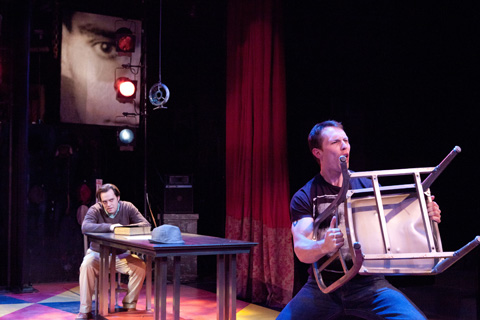
SILENCE IS DEFEAT Theresa Rebeck’s comedy is such a tight ball of mockery, fury, and industry complaint that you forgive its contrivances. |
Gregor Samsa catches the acting bug in Theresa Rebeck's 2008 comedy The Understudy, which is in its area premiere at the Lyric Stage Company of Boston (through January 29). The spur of dramatist and television writer Rebeck's informed satire is the sick dependence of art on celebrity in the American entertainment business. (The proliferation of movie stars on Broadway, opines one character, is "like a disease.") But its premise is that an "undiscovered masterpiece" by Franz Kafka is being kept afloat on the Great White Way by the two action-film stars that make up its cast.
Here the lesser movie kingpin, who is himself understudying the big one, meets, under the frazzled supervision of the stage manager, to rehearse with his understudy, an actual working actor who can't get a three-line part in a celluloid blow-'em-up but who is, as he seethes more than once, NOT BITTER about that. The first joke is that both thespians take their Kafka assignment seriously. The second is the Kafka parody itself, a mish-mash of The Trial and The Castle that drips portent but somehow also involves eating bananas and the firing of a gun. Complicating the honing of this improbable work are the frayed relations of the just-hired understudy and the female stage manager, whom in an earlier life he abandoned at the altar. As they say in the bogus Kafka drama, "Silence is defeat," and this sad sack has nary an excuse to mouth.
The Understudy is hardly an undiscovered masterpiece, but it is such a tight ball of mockery, fury, and industry complaint that you forgive its contrivances, among them the repeated exit of one character from the stage for some trumped-up reason or other, only to eavesdrop via theater loudspeakers on the conversation of the other two. Maybe the threesome are just such drama kings and queens that they want all the world that is a stage — not to mention a backstage and dressing rooms — to know their sad, inner backbiting thoughts. Never mind — when the two competing actors suit up in their somber faces to trudge the "darkling plain" of the Kafka, hilariously lit up by ominous music, all is forgiven. And as Rebeck draws parallels between the play-within-the-play's K, helpless before unanswerable officialdom and the accusing fates, and her own characters, equally if less existentially out of control of their lives, you have to admire the trick.
Adding to the rehearsal chaos kicked up by the power-playing actors and sardonic if broken-hearted stage manager is an unseen stoner in "the booth" who keeps flying in the wrong sets and cueing the wrong music. Larry Coen's crisply frantic staging for the Lyric is abetted in this regard by Cristina Todesco's colorful toy-circus set and Arshan Gailus's sound design, which with its thunderous blasts and eerie tinkling sounds like an Andrew Lloyd Webber scoring for Alfred Hitchcock.